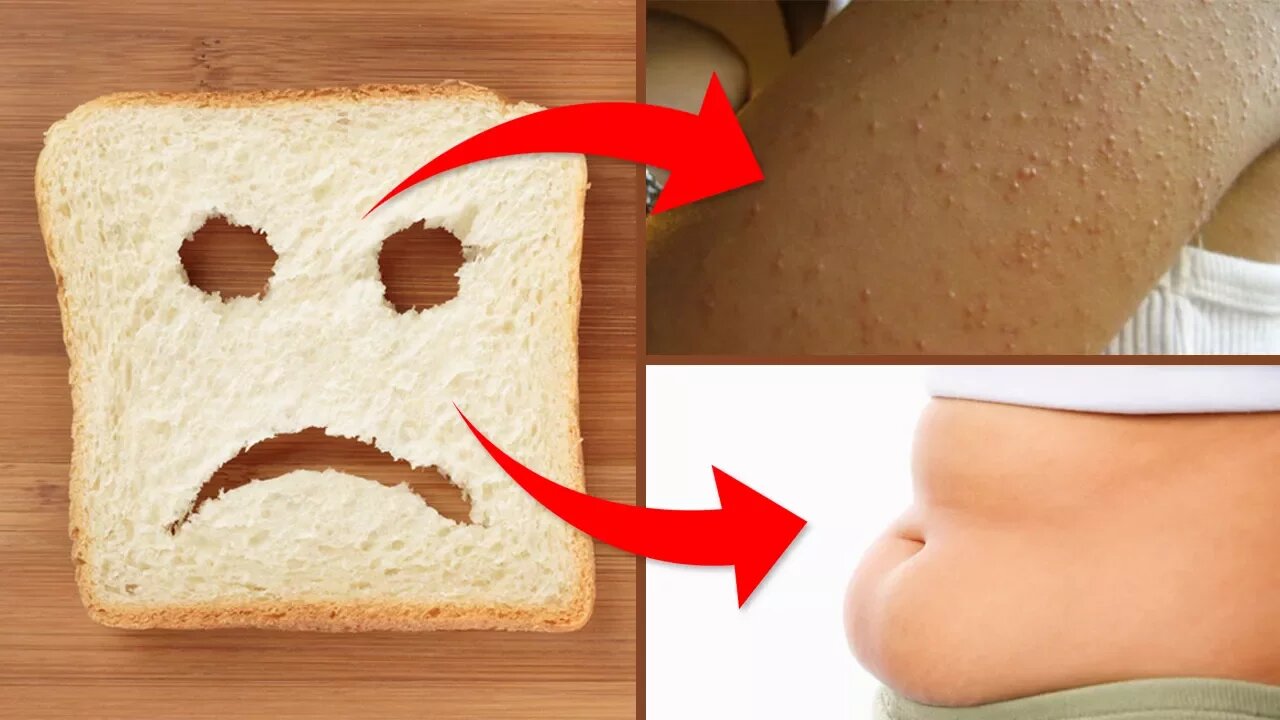Premium Only Content

10 Warning Signs of Gluten Intolerance Everyone Ignores!
Gluten is part of our daily lives, due to the large number of foods that contain gluten that we eat every day. We do this without realizing how much gluten we are ingesting. Breads, cakes, pizza, pastas, cookies, and biscuits all contain gluten—and there are many more also.
Without a doubt foods that contain gluten are among the most consumed foods all over the world.
I mean, who doesn’t like pasta, right?
Meanwhile a lot of people are allergic or intolerant to gluten without realizing it. Few people know what gluten really is and where it’s found.
Then, what exactly is gluten?
It’s the mixture of proteins that are specifically found in the formation of grains such wheat, rye, and barley. Because many foods are made from these grains, including healthy foods such as cereal bars, gluten is widely found in our food chain.
Knowing that gluten is, is an important step in improving your quality of life; however, some of the symptoms of a gluten allergy or intolerance are so common that many people don’t even realize they are allergic or intolerant to gluten.
Besides that, few people know the name associated with gluten intolerance, and are therefore unable to seek treatment or change their eating habits.
Have you ever heard of Celiac Disease?
This sickness is an autoimmune condition that affects people with hypersensitivity to gluten.
Let’s learn about the ten most common symptoms related to a gluten allergy, in order to understand the best way to create a routine to avoid gluten.
1. Digestive problems
Slow digestion or indigestion is one of the main symptoms of gluten intolerance and/or Celiac Disease.
It’s important to be especially alert to constant flatulence, stomach pain, bloating, and diarrhea.
2. Headache
One sign of possible gluten intolerance is chronic headaches, especially after eating anything with gluten in it.
This is not a symptom closely linked to Celiac Disease, but it is a good indication of whether you are intolerant to gluten. Try to pay attention whether or not the pain starts after eating foods with gluten.
3. Chronic Weakness
Constant fatigue, without having performed any physical exercise, is a strong indication of gluten intolerance as well as for Celiac Disease.
4. Mental Confusion
Gluten intolerance can cause confusion, dizziness, and difficulty concentrating. Be aware, as these are also symptoms associated with fatigue, stress or aging.
5. Joint Pain
Gluten intolerance causes inflammation in various parts of the body, especially in the joints.
6. Immune System Problems
Immune system failures can be consequences of a gluten intolerance. With Celiac Disease, the clearest symptom is anemia, which also damages the immune system.
7. Depression
Gluten intolerance is also harmful to people who have depression because it intensifies the symptoms of anxiety, irritability, and sudden mood swings.
8. Skin Lesions
For people who have Celiac Disease, skin lesions such as rashes, eczema, psoriasis and others, are very clear symptoms of the disease.
These symptoms also appear in people with a gluten intolerance, but to a lesser degree.
9. Tooth Decay
When the person has a gluten intolerance, the teeth are weakened and there is a greater chance of cavities.
10. Hormonal Disorders
Hormones can also be severely affected in people with an intolerance to gluten.
In cases of Celiac Disease, a very rapid increase or decrease in weight may be symptomatic of estrogen levels which are out of control. So periodic hormone-level tests are very important.
What to do if you have Celiac Disease and/or gluten intolerance?
If you notice more than one of these symptoms in your daily routine, the first step is to pay a visit to your doctor and ask him to order multiple tests. Ask specifically for him to run the test for Celiac Disease.
After diagnosis, be prepared to eliminate gluten from your daily diet.
If the symptoms are extremely bothersome, you can also do a simple test: Eat a gluten-free diet for a while and check for improvement in your condition. If you feel better, just confirm the diagnosis with the doctor so you can continue your treatment.
Resource(s):
http://www.healthline.com/health/allergies/gluten-allergy-symptoms
http://www.medicalnewstoday.com/articles/312898.php
For more information check our blog:
Disclaimer: The materials and the information contained on Natural Cures channel are provided for general and educational purposes only and do not constitute any legal, medical or other professional advice on any subject matter. These statements have not been evaluated by the FDA and are not intended to diagnose, treat or cure any disease. Always seek the advice of your physician or other qualified health provider prior to starting any new diet or treatment and with any questions you may have regarding a medical condition. If you have or suspect that you have a medical problem, promptly contact your health care provider.
-
 6:47
6:47
Natural Cures
1 year ago $1.46 earnedIf You Take Moringa Powder Every Day, This Will Happen to Your Body
5.27K3 -
 9:22:21
9:22:21
Bitcoin Magazine
2 days agoThe Bitcoin Conference 2025 | Day 2 Livestream
179K26 -
 LIVE
LIVE
Eternal_Spartan
3 hours agoLive - Eternal_Spartan | Doom: The Dark Ages | Come Join the Best Rumble Community There Is!!
247 watching -
 9:27:07
9:27:07
Dr Disrespect
13 hours ago🔴LIVE - DR DISRESPECT - BATTLEFRONT 2 - TRIPLE XP MADNESS
136K14 -
 1:24:28
1:24:28
Joker Effect
4 hours agoHUGE ANNOUNCEMENT come listen
28.5K3 -
 2:02:34
2:02:34
Melonie Mac
5 hours agoGo Boom Live Ep 49!
37.1K12 -
 1:23:57
1:23:57
I_Came_With_Fire_Podcast
4 hours agoIn Politics, A Scalpel Finishes What A Hammer Starts
13.3K1 -
 9:28:58
9:28:58
Spartan (Pro Halo esports Player)
13 hours agoBack from Dreamhack
25.5K1 -
 4:15:16
4:15:16
IcyFPS
5 hours agoSplitgate 2 Tourney Prep 🔥 | EGL 1v1 Showdown Tomorrow!
27.2K2 -
 5:43
5:43
The Shannon Joy Show
8 hours ago💪 Angry Moms vs. D.C. — They’re Awake & Taking Back Power!
33.8K5